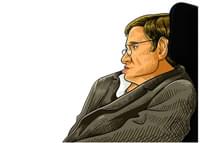
Stephen Hawking: brilliant, but not infallible
Stephen Hawking's reputation as a scientific great is well deserved. But even great scientists can get it wrong when they abandon philosophy. Science and religion, faith and reason, are not in tension but are complementary; faith is not the same as superstition.
With the passing of Stephen Hawking the nation lost its most respected and prominent ambassadors and the scientific community lost one of its greats. In addition, what has become known as the New Atheist movement lost one of its more qualified and less strident activists.
Hawking's personal story is both awe-inspiring and well documented. And his brilliance as a scientific populariser cannot be disputed. As a cosmologist, his ambition was to develop a "theory of everything". What did he mean by that? That in principle a fully developed and completed system of physical sciences, shaped by mathematics, could explain fully the origin, history and destiny of the universe and everything in it. The current Hawking hagiography is absolutely deserved. But it is worth pausing for a moment to admire the scope of that ambition and to perhaps consider a couple of objections.
Hawking took a fairly dim view of philosophy, mainly on the grounds that it has -in his view- failed to keep up with recent developments within the physical sciences. But as the French philosopher Etienne Gilson once remarked, philosophy has a habit of burying its undertakers. Those who argue that philosophy is a moribund discipline might, in other words, want to avoid attempting to practise it. And it is worth noting that Hawking's claim that there can be such a thing as a "theory of everything" as he understood it rests on its own set of metaphysical assumptions. In other words, it is a philosophical claim in its own right. As a philosopher of science would put it: Hawking moves from doing science to announcing scientism, "scientism" being the position that all truth is discoverable by the practice of the empirical sciences. But "scientism" is self-refuting; no empirical discovery could prove it and no mathematical formula could describe it.
Hawking is also well known for his atheism. The "mind of God" he refers to in "A Brief History of Time" is a sort of shorthand for the completed physical theory of the Big Bang. For Hawking, the universe is not created but caused. And the causal explanation makes reference to purely physical laws (along with the initial conditions of the Big Bang). But here too a little philosophy might have helped him to see that the sort of God he was concerned to disprove is not one any sophisticated theist would believe in any way. Classical theism does not hold to a "God of the gaps". Nor does the theist necessarily believe in a God whose sole purpose is to jump-start the physical laws of the universe and then sit back and watch what happens. This is the God of deism and this God is by no means synonymous with the God recognised by the three monotheistic traditions. And what Hawking's scientism overlooks is an issue familiar from those traditions, going back at least as far as medieval times. How can something arise from nothing? This is a metaphysical conundrum that is left untouched by a (scientific) "theory of everything" because whatever the initial physical conditions that oversee the Big Bang are -even if they are mere "laws" with nothing to work on- they are nothing. There is an apparently ineliminable contingency to the universe which Hawking's version of "scientific atheism" can make no sense of why this thing as opposed to that thing and why anything at all? You can answer this question (let us suppose) without using religious claims but you can't answer it without doing philosophy.
Hawking's religious scepticism rested on a common mistake, that of believing that the claims of science and of religion are in competition with each other. Or that we must choose between the claims of faith and those of reason But this is not so; the dichotomy is at best apparent. The original proponent of the Big Bang theory, George Lemaitre, was himself both a renowned physicist and a Catholic priest. Faith comes into its own when reason can take us no further. And this is fine on condition that faith is grounded in the discipline of philosophy, without which it collapses into superstition.
The point can be made in a different way. Why is the natural world explicable in the first place? The intelligibility of the natural order is a precondition of science and therefore cannot be a conclusion of it. It is reasonable to take the universe to be intelligible and therefore not all reason is scientific in form. Science operates according to reason, but reason sometimes moves out from science and into other forms of explanation. Religion (or theology) co-operates with this dynamic. Indeed, the intelligibility of the universe is a fact of deep theological consequence.
Finally, the universe -or rather our experience of it- has a moral structure. Our existence is disclosed to us (or at least some of us) not as a sequence of physical processes to be endured but as a gift. That gift brings with it responsibilities and attachments. Are we really to believe that this moral structure is best characterised by the language of physics, however, developed that language might be? And what argument could take us to that conclusion without smuggling in any philosophy?
Ludwig Wittgenstein -a philosopher himself sceptical of the usefulness of philosophy- once wrote of Bertrand Russell that "[His] books should be bound in two colours, those dealing with mathematical logic in red -and all students of philosophy should read them; those dealing with ethics and politics in blue- and no one should be allowed to read them". We might want to say something similar about Professor Hawking: that his work on cosmology will be massively influential for generations to come; but that his views on equally fundamental questions could have used some work.









